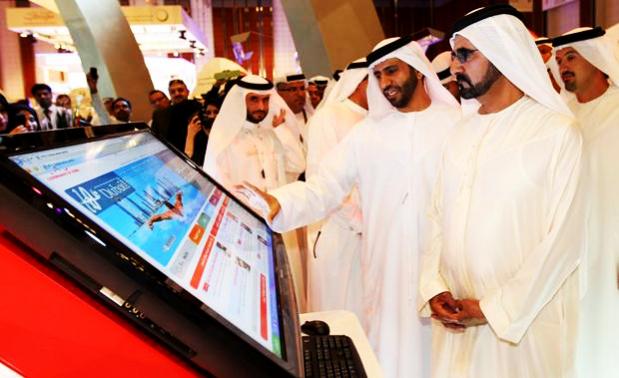UAE Joins the Tech-World

The Internet and other Information Communication Technologiess are rapidly becoming a ubiquitous phenomena in the everyday lives of individuals.
The scope of ICTs continue to widen, with impacts being seen and felt in almost all areas of human institutions such as society, economics, policy, education, or governance. Knowledge of and access to digital innovation has helped foster new networks of knowledge production, fostering change and exchange in knowledge societies.
Countries with high rates of Internet penetration and access are showing signs in the evolution towards a knowledge society connected by information networks. Such changes have also been observed in states in the Arab Gulf such as the United Arab Emirates that have some of the highest Internet penetration rates in the Middle East. Such elements are increasingly driving the development of connected knowledge societies.
Web Index data from the World Wide Web Foundation in 2015 ranks the U.A.E quite high in terms of web access and use when compared to countries such as the United States and the United Kingdom. Within the the U.A.E. innovation and digital technology are not only fostering new forms of offline and online knowledge, they are fundamentally beginning to impact all aspects of society, be it in the public or private sector, government and higher education systems.
Reports by various research organisations ranging from digital governments to smart cities seem to suggest that the impacts of digital technology is already starting to be felt. On one hand, there has been a great migration of government services to the digital sphere. On the other hand, UAE-based enterprises that are both social or commercial have seen an effective application of digital tools to ensure they reach and engagement with the public. Lastly institutions of higher education are now trying to accommodate strategies to improve digital literacy and industry skills.
However, the U.A.E ranks lower when it comes to digital-readiness indicators such as using ICTs, digital and open data for economic development, education, social welfare and governance. In addition, previous research has highlighted the lower rates of knowledge production from Arab Gulf countries such as the U.A.E. that is available digitally.This warrants an understanding of the physical gap between Internet penetration and access and the development of information societies, as well as the forms, production, flow and consumption of knowledge.
There is merit in trying to understand the physical and nonphysical forms and flows of knowledge in information networks and its impact on the knowledge economy of the U.A.E. These changes can be theoretically understood as the rise of the ‘networked society’. While the theoretical concept itself, discussed in depth by theorists such as Van Dijk and Castells is not novel, various characteristics of the network society can help us understand the nuances of its development in specific to the Arab Gulf. Castells argues that the network society is connected through its exchange in information flows that are embedded deeply in the fabric of society. Affecting all aspects, the hyperconnectedness of this knowledge society could be studied more deeply to assess factors such as knowledge production, exchange and information awareness and access in the U.A.E.
We can get a more nuanced understanding of the trends and shifts that define the transnational knowledge economy and the evolution of the information society and its relevance to the changing landscape of the political economy of the Arab Gulf. As cited above, the theoretical lens of Castells’s (2004) concept of the network society helps us build the characteristics of this society. Such an approach will help analyse how countries such as the U.A.E in the Arab Gulf, are placed when it comes to conditions such as knowledge of technology, information (in its various forms) and access to technology especially when considered a crucial hub in the transnational knowledge society.
A critical and impactful understanding of the role of ICTs in the development of the U.A.E. as a knowledge society as highlights crucial areas of policy making that deserve attention. This said, the government of the U.A.E. does stress on the role of ICTs, as a key national performance indicator for innovation and a competitive knowledge economy in its Vision 2021 goals. However, the role of open data embeds itself in various areas of policy making driven by current issues, challenges and opportunities some examples of which include:
- Easing the development and growth of entrepreneurship and innovative business models and SMEs
- Encouraging the use of web powered ICTs for social and environmental impacts such as sustainable growth, inclusivity for marginalized groups, gender equality and improving gender outcomes
- Providing relevant content that helps preserve the Arabic language in digital form, national identity, citizen e-participation and cultural integrity
- Ensuring universal access not marred by the digital divide, web-connected openness, freedom and protection from cybercrime and privacy issues.
(Tania Gupta is an alumna of the Oxford Internet Institute at the University of Oxford. Tania's research interests range from the wider impacts of inequality in digital access and use and the social impact digital technology in the Middle East).



